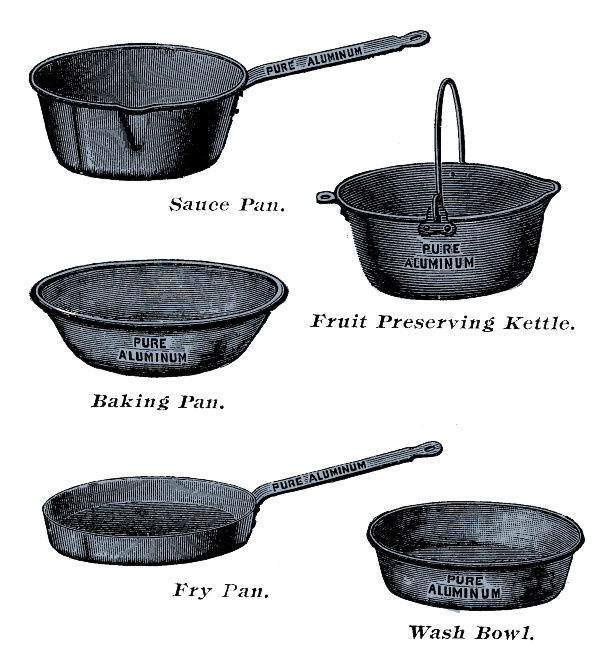From present indications, there is one important field which the metal aluminum has just fairly invaded, and which it will shortly occupy to the exclusion of all other materials. We refer to kitchen and cooking utensils. It has only been within the past year or two that any special attention has been directed to the eminent fitness of this metal for such implements, and that any systematic effort has been made to manufacture such wares and bring their merits to the notice of the public. This tardy recognition of one of the most useful applications of the metal is to he ascribed partly to the fact that it has only been within a comparatively short time that the price of aluminum has been low enough to warrant its use for such utensils; and partly to the persistence, until quite recently, of a belief–now fully demonstrated to be erroneous–that aluminum would be unable to withstand the corrosive action of the various acids and other products used in or present in food products. This is now known to be quite without foundation, and the experiments on which this erroneous belief obtained wide circulation have been shown to be utterly unreliable. They were made by suspending weighed strips of aluminum foil in various articles and preparations of food and drink–tea, coffee, wine, vinegar, salt water, etc., etc., and noting the effect after a certain period. The fact that the results turned out unfavorably is just what might have been anticipated and predicted, for there are no metals–except gold and platinum–that, in such extremely fine leaves, could withstand successfully so severe a test.
The fallacy of such a test was soon pointed out, and the same experiments were made with strips of heavy sheet aluminum; in other words, with the metal in the form of a solid body in which it would be used in the construction of kitchen utensils. The outcome of this series of experiments was quite different, and proved conclusively that, in respect of its resistance to such corrosive influences as would be likely to he encountered in this species of service, aluminum compared favorably with any of the other metals used for the same purpose.
In addition to this, it should be said, that aluminum has properties that make it particularly valuable for kitchen utensils. For example, its salts are practically harmless, which cannot be said of tin, copper, and some of the glazes and enamels used as the lining of cooking vessels. Also, the metal has a comparatively high specific heat, and consequently has the property of retaining its heat for a considerably longer time than vessels of cast iron. Furthermore, its lightness is in its favor, as also is its light color and cleanly appearance, and it exhibits no disposition to blacken.
At present, the first cost of aluminum utensils is somewhat higher than that of the same articles of tinned or enameled ware; but tinned articles require intelligent care at all times to prevent rusting, and enameled ware is easily ruined by careless use, while the aluminum ware is practically indestructible, so that in the long run it proves the truth of that much misused saying, “the best is the cheapest.
Another decided advantage claimed to be possessed by the aluminum utensils, lies in the fact that food in cooking does not adhere to the bottom or sides of the vessels. Every housewife knows how difficult it is to keep a coffee pot sweet and clean, especially where eggs are used to clarify the coffee. When an aluminum coffee pot is used, the grounds can be emptied out without trouble, and a simple rinsing in cold water cleans the pot thoroughly. In frying or stewing potatoes, or other starchy foods, also, it is affirmed that no particles stick to the spider.
Taking the facts as we now apprehend them, and supplementing these by the experience of careful and competent specialists who have used aluminum utensils, we feel tolerably well assured that here is a direction in which the new metal is destined to play a very important part.
Our readers, and especially those of the gentler sex, should be gratified to learn that aluminum cooking and other kitchen utensils are now regularly manufactured articles that can be had in the market, and we do not hesitate to commend them highly to their notice, with the assurance that they will be found in every respect admirable.
The Illinois Pure Aluminum Company, whose works are located at Lemont, Ill., have gone extensively into this branch of manufacture, and their products, some of which we show in picture, include baking pans, sauce pans, preserving kettles, fry pans, roasters, dippers, drinking cups, coffee pots, wash boilers, wash bowls, sanitary pails for household use, and larger vessels of this material for hotels, restaurants, etc.

